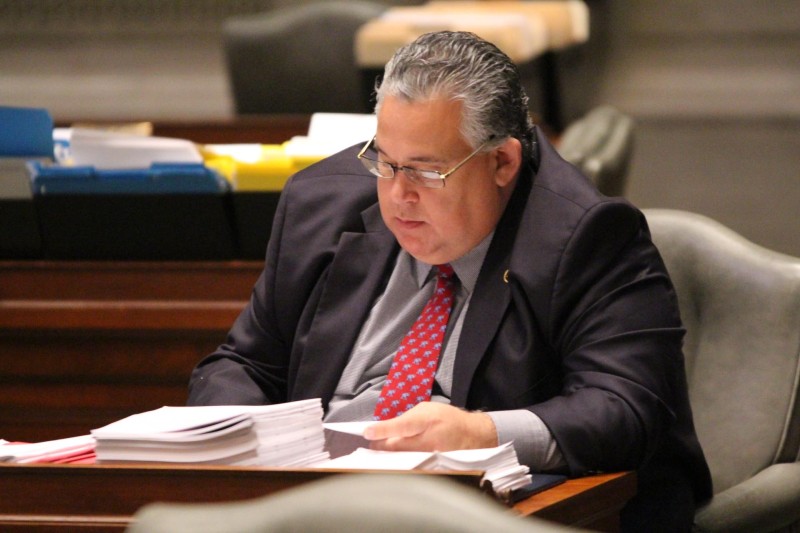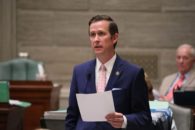JEFFERSON CITY, Mo. – Several bills have been lined up, waiting for conference committees to work out the differences between the Missouri House and Senate.
A few of these bills currently on that list arrived there after the House took pleasure in attaching amendment after amendment to the legislation, a message to the Senate.
And while those bills now carry hefty amendments that seemingly signal the demise of the bill, one could actually make it across the finish line with some of the amendments placed on it. Instead of a bill concerning port authorities, it’s become an omnibus bill carrying several potential job-creating provisions.
Sen. Paul Wieland is the sponsor of SB 302, and says that the original intent was to clean up language for port authorities and specify how to create Advanced Industrial Manufacturing (AIM) zones.
The bill would exempt professional service contracts from the requirement that any expenditure made by a port authority that is over $25,000 be competitively bid. It also would change language in regards to payment of employees, allowing port authorities pay county rates in lower economic areas instead of what would be paid in cities like St. Louis and Kansas City.
But SB 302, with its new attachments, has caught the eye of companies and people in the utility industry, mainly because the first two amendments tacked on surround issues they are concerned with.
The first amendment, filed by Rep. Don Rone, would put in provisions that would allow for special utility rates for certain aluminum smelting and steel work facilities. In plain terms, would potentially provide an opportunity for the New Madrid aluminum smelting facility to reopen and attract a new mill to the boot heel. Both could be major boons to southeast Missouri in their mission to create jobs.
The second amendment, tacked on by Rep. Dean Plocher would potentially give the Missouri Public Service Commission new tools in their job as regulators, allowing for ratemaking adjustments and greater roles in investment and economic development opportunities. His amendment would allow for utility companies to recover their full cost of service through the use of updated rate adjustment mechanisms.
In fact, an email this week has been circulating from one of the state’s top utility companies, Ameren, urging people to “reach out to your legislators and urge them to support SB 302.”
In short, it provides another chance for legislation concerning energy policies and grid modernization that had been filed earlier in the session to be passed.
“We’re looking at the possibility of the steel mill coming, and it’s going to bring a lot of jobs,” Rep. Becky Ruth said. “It’s going to not just only impact the boot heel, but all of our state.
“When Noranda left, they lost 980 jobs,” she continued. She pointed out that getting those jobs back puts back more consumers in the market as well, saying it will have a far-reaching impact.
She said she would be working closely with Wieland to find the right compromises, but they won’t know which ones will potentially have to be dropped until they meet with the conferees.
“I think in conference we’re going to be looking carefully at all of the amendments to determine which ones will be able to still on,” Rep. Becky Ruth said.
According to Wieland, the conference committee has been scheduled to meet Wednesday morning at 9:30 a.m.
He says that he doesn’t have any issues with any of the individual amendments, but notes that the passage of all 10 could be somewhat troublesome.
“I look at each of these amendments, I think they make good sense. They’re going to create jobs and economic development for the state, which is something I think everybody wants. I’m fine with that,” he said. “Where the problem is… it’s that everybody comes to Jefferson City and says they want to create jobs for the state. But everybody has a different way of wanting to do that.”
That being said, the senator has already been working to find compromises on the omnibus bill, and hopes to put something together that everyone can agree upon.
“It will create jobs, and that’s what we’re all about. So this is another way to get it done,” he said.
We’re looking to see how we can appease everybody and get it to a vote,” he finished. “The goal is to get it palatable enough so that every senator says ‘Even though I may not like an aspect of the bill, or may not vote for the bill, I will allow it to go to a vote.” Will I get there? We’ll know by 6 o’clock on Friday.”
To view the full list of amendments, click here.
Benjamin Peters was a reporter for The Missouri Times and Missouri Times Magazine and also produced the #MoLeg Podcast. He joined The Missouri Times in 2016 after working as a sports editor and TV news producer in mid-Missouri. Benjamin is a graduate of Missouri State University in Springfield.






















